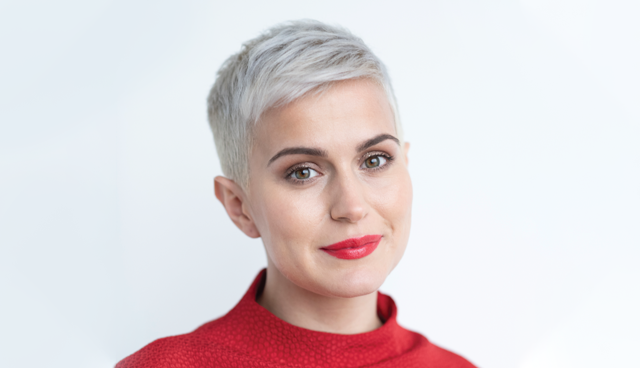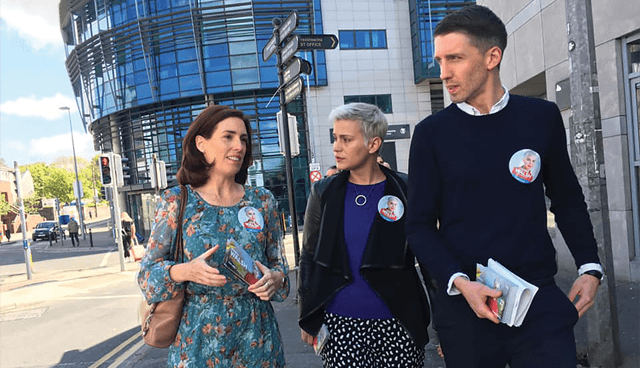“It’s great when you can surprise people and even surprise yourself”

Fresh from her victory in the Midlands North West constituency, where she won a second seat for Fine Gael, new MEP Maria Walsh speaks with Odrán Waldron about her campaign, her first experiences of Brussels and what she hopes to achieve within the European Parliament.
“I had been working towards the seat for many months, not just the six-week window coming up to the campaign,” Walsh reflects. “I made the decision to run with Fine Gael in early September 2018, from then on it was about meeting people and seeing if there was buy-in from party members.”
A native of Shrule, a village of less than 500 people on the Mayo side of the border with Galway, Walsh was previously well known as the winner of the 2014 Rose of Tralee International Festival. She represented Philadelphia, the city she had moved to in 2011. “I loved reintroducing myself to the Midlands North West as a politician, but with the same characteristics as previously,” she says. “The politicking of it was difficult; it was new because I didn’t grow up in party politics. Every day there were lessons about what went well and what didn’t, so recaps became very important.
“I was delighted on the Wednesday night, to get an additional seat for Fine Gael in Midlands North West was great. It’s great when you can surprise people and even surprise yourself. I always knew we could secure the seat with good grounding and covering of the area. All the hard work came through with that final vote, which was really exciting.”
Without that past in party politics, Walsh was left with a choice to make once she had decided to forge a political career. Having attended a conference aimed at getting more women involved in elections, she attended a networking night and chose Fine Gael: “I had met a number of politicians over the last five years at various events; Enda Kenny was probably the first politician I ever met because Shrule was in his constituency, so Fine Gael was always in the mix. I sat in front of the party and it went from there; it was very much the two of us coming together rather me going to them or them coming to me.”
Election followed the choice of party for Walsh, who was elected third out of four seats, ranking fourth in terms of first preference votes with 10.8 per cent of the vote, a total of 64,500. Walsh was the only non-incumbent elected, gaining the seat given up by the independent MEP Marian Harkin for Fine Gael. Her win has led to major change in her life, but it is a situation which she is used to, she says: “I was self-employed for so many years, so I’m used to crazy travelling. Five years ago, I was living in two places at the one time; I kept my full-time job in Philadelphia while fulfilling an ambassador role in Ireland and around the world.
“I leave Shrule at 2am on a Monday and get back late on the Wednesday or early as possible on the Thursday. It’s a little bit difficult to train your body because when you hit the ground in Brussels, you’re in full committee mode. You can catch 40 winks on the plane and hope the hours wear off. You split your week; the back end of mine is all constituency work. The first couple of weeks have been bright and shiny, everything has been great.”
Walsh hasn’t been eased into her new role, saying that she and the rest of the Irish MEPs “hit the ground running and went straight into figuring out where the Irish delegation would work best covering”. Walsh is now sitting on EMPL, the committee for employment and social affairs as a full-time member, while substituting on PECH and LIBE, the committees for fisheries and civil liberties, justice and home affairs respectively. She plans to join the intergroup for LGBTI rights in order to “push my youth focus on mental health”.
“It’s phenomenal to me, the amount of work you can get through, the amount of cross-party participation,” Walsh says on her first weeks in the European Parliament. “It’s less about individual nations and parties and more about how well you can get on with groups and how you can inject the Irish standpoint. You’re not necessarily always representing your constituency even though that’s who elected you, sometimes you have to cover all of Ireland. The European People’s Party (EPP) having the most seats in the Parliament has been a help, but again it’s down to who you work best with and how you do that.”
As she settles into life in Brussels, Walsh has a clear set of objectives to tackle: “The campaign reignited the reasons I made that decision in me and I want to see how we get people home, how we get people to see the west and north west as a place to grow business, to raise a family and to come to for further education.
“The disconnect of life beyond the M50 is what we need to tackle. We need to offer better work-life balance for when companies want to set up in Ireland, and to promote and foster the young people sitting around their kitchen tables trying to develop an idea through technology or tourism or whatever it may be.
“I am a Jigsaw ambassador and positive mental health is a big initiative for me, connecting all orientations and genders, be they rural or urban, which is why I’m championing a European year of good mental health. It’s something I’ve been working on since before the election; we have a real opportunity to make a difference here. Listening to our president-elect [Ursula von der Leyen], I see the impact positive mental health can have within her strategy so we’re hoping to connect the dots there.”
The disconnect of life beyond the M50 is what we need to tackle. We need to offer better work-life balance for when companies want to set up in Ireland, and to promote and foster the young people sitting around their kitchen tables trying to develop an idea through technology or tourism or whatever it may be.
Despite not sitting on any agriculture committees, Walsh says that her rural base means that she takes a natural interest in the industry’s fortunes, with her focus being “connecting women in agriculture and generational renewal, ensuring that young people are looking at farming as a livelihood rather than a struggle”.
Outside of agriculture, Walsh sees potential for the further development of rural Ireland: “We have great small villages and towns. The Smart Villages initiative coming out of Europe was championed by Commissioner Hogan, which would make areas like Shrule or Ballinrobe near me into hubs that link back into Galway city, meaning people don’t necessarily have to commute or travel far from their homes but can still be involved in innovation.
“I worked in Workbench by Bank of Ireland in Limerick and I see the benefits of workbenches and co-working spaces and the serendipitous moments that can happen or the businesses that can be built based off conversations. When I moved back to Ireland from America, I set up a company that worked to bring business into the creative sector, but a huge issue that I found with local enterprise boards was that a lot of initiatives around import and export are focused on manufacturing. Not everybody is in manufacturing, 60 per cent of local businesses in small towns and villages are owned by women. We need to retain them because if we start losing businesses like that then people will stop coming to those towns and villages, which will turn smaller areas into commuter belts.”
As a woman in the European Parliament, whose ascent to political status was explicitly tied to womanhood through her participation in the conference that started her on this road, Walsh is in a position where her mentors are some of the most powerful women in the European Union. Her Fine Gael colleague and fellow Midlands North West representative is MEP Mairead McGuinness, the newly retained First Vice-President, and the newly elected President von der Leyen is an EPP colleague. “Talk about a phenomenal force in the political world,” she says of McGuinness. “The votes Mairead procured [to hold her position] are a testament to the work she’s put in for the last three terms. Equally, to watch her hold a room and ensure that various personalities are held to being political leaders in a space that was built for peace and prosperity has been phenomenal to watch.

As a woman and a new MEP, listening to our president elect’s speech was unbelievable. There are very few moments where you get to watch history write itself before you; the fact that she’s our first female president, calling on inequalities and gender issues from the get-go was a picture of the way I hope her mandate will go.
“With Ursula, while it wasn’t a traditional — EPP would have preferred we had secured the spitzenkandidat [Manfred Weber] and kept democracy as is — things change and the first couple of weeks were quite trying as a new member trying to figure out conversations that were happening at a higher level and how you relate that back to your constituents. It’s of course disappointing not to see Manfred prevail, but this is politics and democracy at the same time and sometimes things don’t work out. He put what was best for the EPP and the Parliament ahead of himself and he was amazing to watch, his ability to digest what had happened. As a woman and a new MEP, listening to our President elect’s speech was unbelievable. There are very few moments where you get to watch history write itself before you; the fact that she’s our first female President, calling out inequalities and gender issues from the get-go was a picture of the way I hope her mandate will go.”
Concluding, Walsh moves onto the two biggest issues that pervade any conversation about the EU and its Parliament: “Brexit and climate change won’t be disappearing any time soon; Brexit certainly won’t be disappearing after 31 October. We have a long debate and negotiation to protect citizens in Ireland, north and south, and the rest of the EU.
“Ireland is most at risk, which is why I pushed to sit on committees for areas I knew would be most impacted such as fisheries. Fisheries are going to be the first hit and we are already seeing ripple effects. The debate around the retention of waters will be a big talking point for years to come. What is fascinating for a new MEP sitting with the EPP, which is, dare I say, a little more conservative — I would consider us to be centre in economics but I’m pushing for the group to be more left on social issues — climate is not just about green parties and candidates talking about it. It’s a conversation that shouldn’t be held by one standard and one group, like Brexit. We need to ensure that generations coming behind us are protected,” she concludes.





